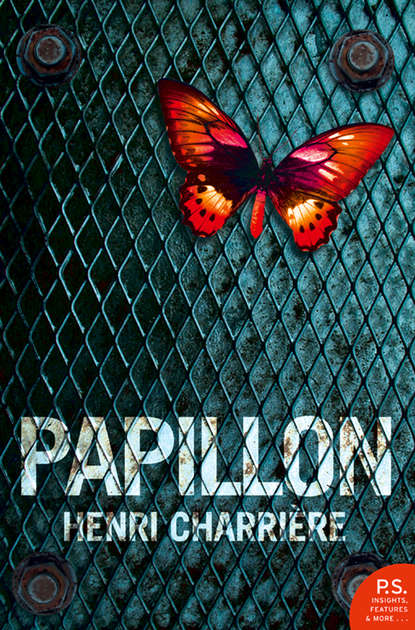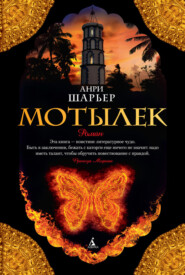По всем вопросам обращайтесь на: info@litportal.ru
(©) 2003-2025.
✖
Papillon
Настройки чтения
Размер шрифта
Высота строк
Поля
‘I believe you, Dega. But I believe in myself, too. I won’t waste much time there. That’s something you can be sure of. I’m a sailor and I understand the sea, and you can trust me when I say I shall make a break very soon. And what about you? Can you really see yourself doing ten years hard? Even if they do give you five off, which is not at all sure, do you really think you could do it without being driven crazy by the solitary? Take me now, all alone in that cell with no books, no going out, no being able to talk to anyone twenty-four hours every god-damned day – it’s not sixty minutes you have to count in each hour but six hundred: and even then you’re far short of the truth.’
‘Maybe. But you’re young and I’m forty-two.’
‘Listen, Dega, tell me straight: what is it you’re scared of most? The other lags, isn’t it?’
‘To tell you straight, Papi, yes it is. Everyone knows I’m a millionaire, and there’s no distance between that and cutting my throat because they think I’m carrying fifty or a hundred thousand on me.’
‘Listen, do you want us to make a pact? You promise me not to go crazy and I’ll promise to keep right next to you all the time. Each can support the other. I’m strong and I move quick: I learnt how to fight when I was a kid and I’m terrific with a knife. So as far as the other lags are concerned you can rest easy: we’ll be respected, and more than that we’ll be feared. As for the break, we don’t need anyone else. You’ve got cash, I’ve got cash: I know how to use a compass and I can sail a boat. What more do you want?’
He looked at me hard, right in the eye … We embraced one another. The pact was signed.
A few moments later the door opened. He went off with his pack in one direction and I in the other. We were not very far apart and we saw one another from time to time at the barber’s or the doctor’s or in chapel on Sundays.
Dega had been sent down for the business of the phony National Defence bonds. A bright forger had produced them in a very unusual way: he bleached the five hundred franc bonds and overprinted them with the ten thousand franc text, absolutely perfectly. As the paper was the same, banks and businessmen accepted them just like that. It had been going on for years and the government’s financial section was all at sea until the day they picked up a character named Brioulet – caught him red-handed.
Louis Dega was sitting there calmly, keeping an eye on his bar in Marseilles, where the pick of the southern underworld came every night and where the really hard guys from all over the world met one another – an international rendezvous. That was 1929 and he was a millionaire. Then one night a young, pretty, well-dressed woman turned up. She asked for Monsieur Louis Dega.
‘That’s me, Madame. What can I do for you? Come into the next room.’
‘Look, I’m Brioulet’s wife. He’s in Paris in prison for passing forged bonds. I saw him in the visiting-room at the Santé: he gave me the address of this bar and told me to come and ask you for twenty thousand francs to pay the lawyer.’
It was at this point, faced with the danger of a woman who knew his part in the business, that Dega, one of the most esteemed crooks in France, made the one remark he never should have made. ‘Listen, Madame, I don’t know your husband from Adam, and if you need money, go on the streets. You’re young and pretty and you’ll make more than you need.’ Furious, the poor woman ran out in tears. She told her husband. Brioulet was mad and the next day he told the investigating magistrate everything he knew, directly accusing Dega of being the man who produced the forged bonds. A team of the most intelligent detectives in the country got on to Dega’s trail. One month later Dega, the forger, the engraver and eleven accomplices were all arrested at the same moment in different places and put behind bars. They came up at the Seine Assizes and the trial lasted fourteen days. Each prisoner was defended by a famous lawyer. Brioulet would never take back a single word. And the result was that for a piddling twenty thousand francs and a damn-fool crack the biggest crook in France got fifteen years hard labour. There he was, ten years older than his age, and completely ruined. And this was the man I had just signed a treaty with – a life and death pact.
Maître Raymond Hubert came to see me. He wasn’t very pleased with himself. I never uttered a word of blame.
One, two, three, four, five, about turn … One, two, three, four, five, about turn. It was a good many hours now that I had been walking up and down between the door and the window of my cell. I smoked: I felt I was well in control, steady-handed and able to cope with anything at all. I promised myself not to think about revenge for the time being. Let’s leave the prosecuting counsel just there where I left him, chained to the rings in the wall, opposite me, without yet making up my mind exactly how I’d do him in.
Suddenly a shriek, a desperate, high-pitched, hideously dying shriek made its way through the door of my cell. What was it? It was like the sound of a man under torture. But this was not the Police Judiciaire. No way of telling what was going on. They turned me right up, those shrieks in the night. And what strength they must have had, to pierce through that padded door. Maybe it was a lunatic. It’s so easy to go mad in these cells where nothing ever gets through to you. I talked aloud there all by myself: I said to myself what the hell’s it got to do with you? Keep your mind on yourself, nothing but yourself and your new side-kick Dega. I bent down, straightened up and hit myself hard on the chest. It really hurt: so everything was all right – the muscles of my arms were working perfectly. And what about your legs, man? You can congratulate them, because you’ve been walking more than sixteen hours now and you’re not even beginning to feel tired.
The Chinese discovered the drop of water that falls on your head. The French discovered silence. They do away with everything that might occupy your mind. No books, no paper, no pencil: the heavily-barred window entirely boarded up: only a very little light filtering through a few small holes.
That piercing shriek had really shaken me, and I went up and down like an animal in a cage, I had the dreadful feeling that I had been left there, abandoned by everybody, and that I was literally buried alive. I was alone, absolutely alone: the only thing that could ever get through to me was a shriek.
The door opened. An old priest appeared. Suddenly you’re not alone: there’s a priest there, standing in front of you.
‘Good evening, my son. Forgive me for not having come before, but I was on holiday. How are you?’ And the good old curé walked calmly into the cell and sat right down on my pad. ‘Where do you come from?’
‘The Ardèche.’
‘And your people?’
‘Mum died when I was eleven. Dad was very good to me.’
‘What did he do?’
‘School-teacher.’
‘Is he alive?’
‘Yes.’
‘Why do you speak of him in the past if he is still alive?’
‘Because although he’s alive all right, I’m dead.’
‘Oh, don’t say that! What did you do?’
In a flash I thought how square it would sound to say I was innocent: I replied, ‘The police say I killed a man; and if they say it, it must be true.’
‘Was it a tradesman?’
‘No. A ponce.’
‘And they’ve sentenced you to hard labour for life for something that happened in the underworld? I don’t understand. Was it murder?’
‘No. Manslaughter.’
‘My poor boy, it’s unbelievable. What can I do for you? Would you like to pray with me?’
‘I never had any religious instruction. I don’t know how to pray.’
‘That doesn’t matter, my son: I’ll pray for you. God loves all His children, whether they are christened or not. Repeat each word as I say it, won’t you?’ His eyes were so gentle, and such kindness beamed from his round face that I was ashamed to refuse; and as he had gone down on his knees I did the same. ‘Our Father which art in heaven …’ Tears came into my eyes: the dear priest saw them and with his plump finger he gathered a big drop as it ran down my cheek. He put it to his mouth and drank it. ‘My son,’ he said, ‘these tears are the greatest reward God could ever have sent me today, and it comes to me through you. Thank you.’ And as he got up he kissed me on the forehead.
We sat there, side by side on the bed again. ‘How long is it since you wept?’
‘Fourteen years.’
‘Why fourteen years ago?’
‘It was the day Mum died.’
He took my hand in his and said, ‘Forgive those who have made you suffer so.’
I snatched it away and sprang into the middle of my cell – an instinctive reaction. ‘Not on your life! I’ll never forgive them. And I’ll tell you something, Father. There’s not a day, not a night, not an hour or minute when I’m not busy working out how I’ll kill the guys that sent me here – how, when and what with.’
‘You say that, my son, and you believe it. You’re young, very young. As you grow older you’ll give up the thought of punishment and revenge.’ Thirty-four years have passed now, and I am of his opinion. ‘What can I do for you?’ asked the priest again.
‘A crime, Father.’
‘What crime?’
‘Going to cell 37 and telling Dega to get his lawyer to ask for him to be sent to the central prison at Caen – tell him I’ve done the same today. We have to get out of the Conciergerie quick and leave for one of the centrals where they make up the Guiana convoys. Because if you miss the first boat you have to wait another two years in solitary before there’s another. And when you’ve seen him, Father, will you come back here?’
‘What reason could I give?’
‘You could say that you forgot your breviary. I’ll be waiting for the answer.’
‘And why are you in such a hurry to go off to such a hideous place as the penal settlement?’








